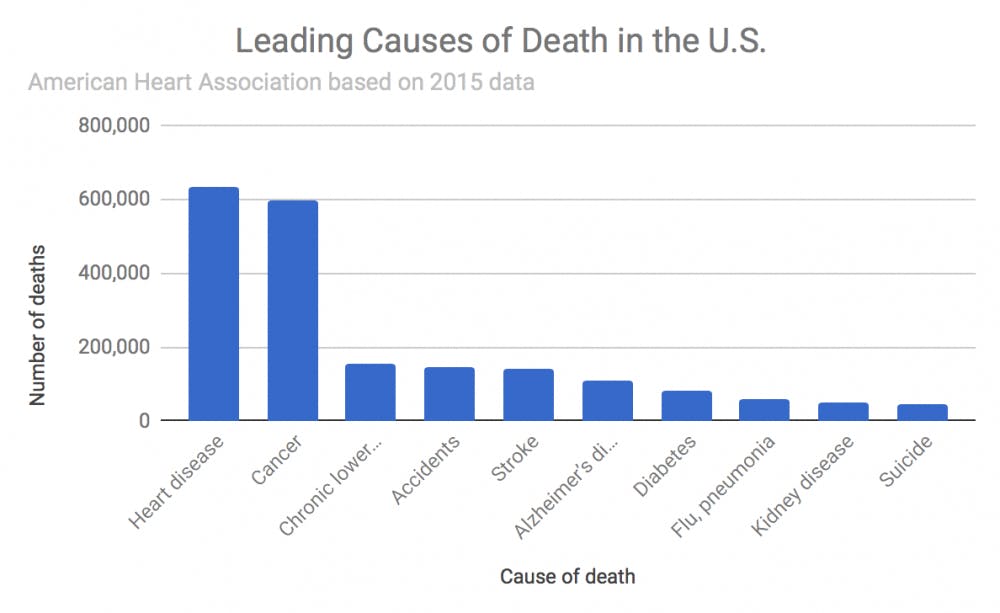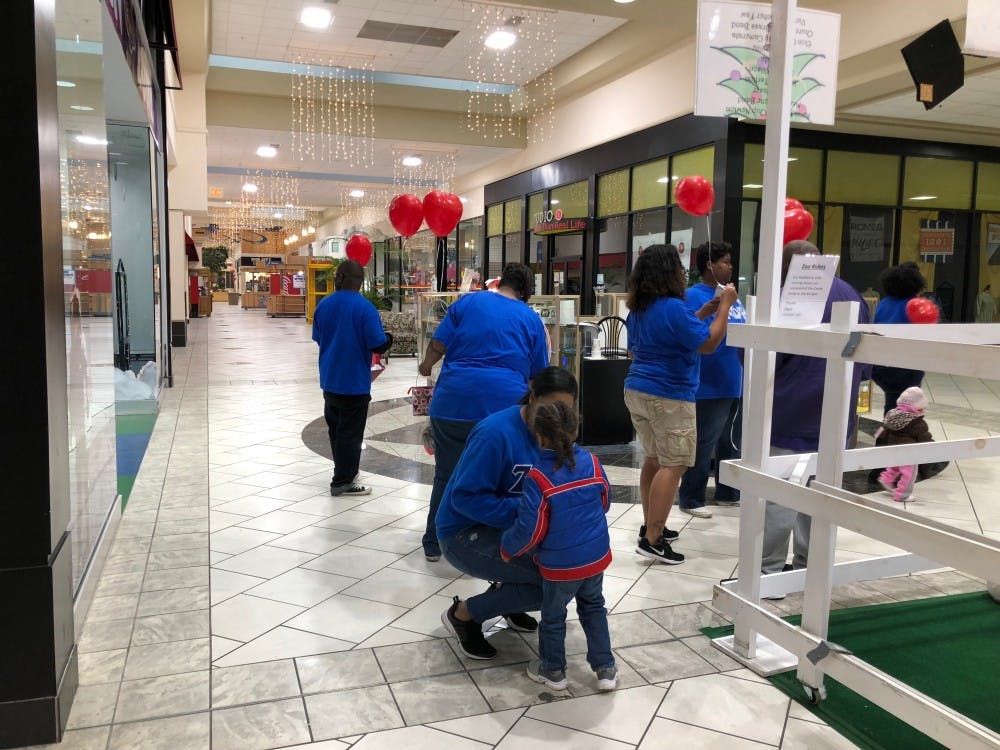A piercing pain suddenly overwhelmed 32-year-old Ruby Thornton 10 years ago. The room’s air conditioner was on full blast, yet she was drenched in sweat. Shaking and disoriented, Thornton screamed for help, but her voice was inaudible.
Thornton’s father immediately rushed her to the hospital. The doctors explained she had experienced a heart attack, and they diagnosed her with mitral valve prolapse, a type of heart disease in which the valve between the heart’s upper and lower chambers close improperly.
Then, two months later, just when Thornton thought the worst of her pain was over, she had a stroke.
After these events, Thornton decided she no longer wanted the fear of her impending death to consume her daily thoughts.
Thornton chose to prioritize her health with daily exercise, balanced meals, yearly cardiologist appointments and frequent weight checks. With lifestyle changes like these, individuals can lower their risk of heart disease by 82 percent, according to the American Heart Association (AHA).
After 10 years of this healthy lifestyle, Thornton has overcome her battle with heart disease.
“I am a survivor,” Thornton said. “I didn’t dwell on the disease or have a pity party. I wanted to move it forward. I wanted to bring awareness.”
However, other heart disease victims in the U.S. do not always experience the same fate. Heart disease is the leading cause of death in the U.S., with one in four deaths each year, according to the AHA.

Encouraging healthy habits through walking
Due to the extent and severity of this disease and Thornton’s own personal experience, she decided to organize Zetas Have Heart Walkathon with Burlington’s Pi Kappa Zeta Chapter of Zeta Phi Beta Sorority Inc., of which she is a member. This event occurred Saturday morning at Holly Hill Mall and Business Center in Burlington to raise awareness about heart disease and inspire others to practice healthy habits like walking to combat heart disease.
“It’s a fundraiser for the disease, but it’s also preventing the disease at the same time and inspiring people to see how much they can do,” said Sarah Parker, a nurse practitioner at Elon University Student Health Services.
At the beginning of the event around 8:45 a.m., before the walking began, Thornton shared her heart attack story with the event attendees to spark a connection with them and to inspire healthy living.
Then, at 9 a.m., participants from the Burlington community and Zeta Phi Beta walked three laps along the perimeter of the mall to take that first step on their journey of health.
After the walk, Sonya Stanley, the secretary of the chapter, drew names from a raffle in which people won prizes that local businesses donated. To end the event, each participant released a balloon in remembrance of those who lost the battle to heart disease and to honor heart disease survivors.
Throughout the event, the organizers provided blood pressure screenings and refreshments of tea, water, juice and fruit to promote a healthy lifestyle. However, Thornton said the event organizers also offered 100 doughnuts from Dunkin’ Donuts to remind people that health includes balance.
To motivate the attendees to enjoy the walk, Charles Murrill, Stanley’s godson, was the DJ who played music in the hospitality room, which mall owners gave to the event organizers for free.

Parker said a lack of motivation is often a barrier that hampers people’s commitment to exercising, so a walkathon can transform people’s perceptions of physical activity. She explained walking in a group and for a cause becomes more fun, social and manageable, which is likely to translate into a permanent habit.
“I think small steps lead to more success,” Parker said. “Once people start exercising, they realize how much better they feel and how much more energy they have.”
Thornton said hosting a walkathon was an intentional choice because walking is a reasonable act that anyone can accomplish. She explained that after people complete the walkathon, they feel more confident in their ability to lead healthy lives and will thus be more motivated to increase their physical activity in the future.
“We know that a lot of people aren’t into big cardio to start off, so we figured a walkathon would be something people can do at their leisure and still support a great cause,” Thornton said.
The walkathon also gave the sorority and other event attendees the opportunity to help others achieve healthy lives through community service.
“We are a community-conscious, action-oriented organization, and so our organization’s purpose is to give back to the community in any way we can,” Stanley said.
These participants and the sorority women paid a registration fee for the walkathon, which was $5 for children under 12 and $10 for adults. All proceeds went to fund the AHA’s initiative to bring heart-healthy programs to schools and create classes on heart disease awareness.
Thornton said contributing a small donation still has the potential to make a big difference. AHA is a voluntary organization that is dedicated to raising money to fight heart disease and stroke, so by donating to AHA, the walkers will reach a wider audience.
Defining heart disease
According to the Centers for Disease Control and Prevention (CDC), heart disease is any type of disease of the heart that can either be hereditary or can develop from an unhealthy lifestyle.
Parker explained that two significant risk factors of heart disease are physical inactivity and eating an unhealthy diet that is high in sodium.
Americans often spend their days sitting at work or school, which serves as a challenge for people who want to prioritize fitness, Parker said. This sedentary lifestyle endangers people’s lives.
“If you have a sedentary job and exercise 30 minutes a day, it really does nothing to decrease your risk factors for things like heart disease,” Parker said.
Since the walkathon inspires people to refocus their efforts on improving their health, Parker said this event is a beneficial initiative that aims to introduce more frequent physical activity in people’s daily lives.
Other risk factors for heart disease include smoking, excessive alcohol consumption, high blood pressure, high blood cholesterol, diabetes and being overweight or obese.
To decrease these risk factors and prevent heart disease, individuals can consume less sodium and alcohol, exercise regularly, eat a healthy diet of whole grains, lean protein, fruits and vegetables, maintain a healthy weight, quit smoking, check their blood pressure and cholesterol levels and manage their stress levels, according to the CDC.
Heart disease is a meaningful cause to the six graduate members and four undergraduate members of the Pi Kappa Zeta Chapter of Zeta Phi Beta. This sorority has been striving to serve the community and help others excel since it was founded in 1920.
One of Zeta Phi Beta’s national programs called Zetas Have Heart increases awareness about heart disease and encourages members of the sorority to become more active. In this program, the women complete 30-day challenges that encourage them to exercise for 30 minutes at least three times a week. The walkathon was a part of this campaign.
Since the sorority members said health is an ongoing mission that determines the programs they coordinate and the message they share, they said they hope the act of walking will spark people’s interest in and commitment to a healthier lifestyle.
“What people have to remember is you don’t have to start off big to lead a healthier lifestyle,” Thornton said. “Something as simple as walking can make a difference. It can change your lifestyle.”


